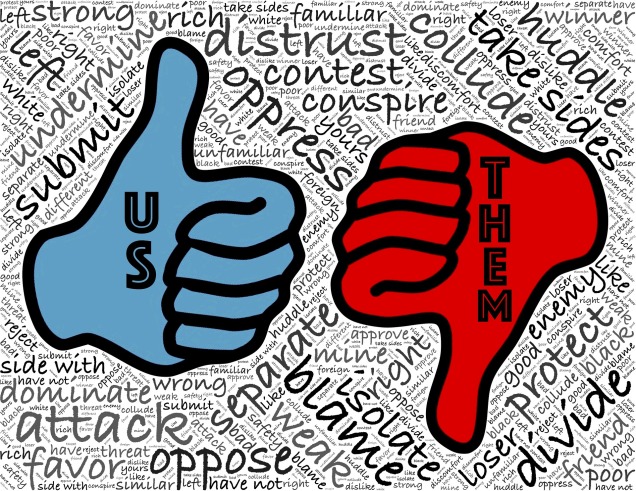
Last week, a Google employee wrote a memo surmising why women are so scarce in the technology sector of Silicon Valley. As I understand it, the memo does not disparage women but instead shows how genetic traits may naturally lead more men to a certain profession than women and vice versa. He in fact gives suggestions about how the tech industry could use particularly feminine traits to better Google’s business practices. The problem is that he was suggesting that men were different than women… Most haven’t even read the memo. The media then twists it and spreads it. Outrage breaks out. The Google employee is fired the next morning.
You’ve got people who are upset over police violence or a shooting, the media showing the victims mother on a soapbox, declaring her child’s innocence; a member of the church choir even. Without even looking into the circumstances, everyone says, “well there ya have it. All cops are racist, murdering thugs.” Cities are torn apart. Cops are targeted and murdered in the streets.
I’m just tired of it. I’m tired of people who hear of an event or position that fits their established narrative and then simply echoing it, without looking into the circumstances or even questioning their own pre-conceived notions. I’m tired of this country being controlled by the whims of sheep.
I’m not entirely sure what it is, whether it’s my background in military Intelligence where I evaluate every side of every thing, the fact that I’m a civilian now amongst more civilians, or whether or not the world (or I) has really changed that much in the last decade. Perhaps I should just stop listening to the news on the drive into work every morning. I’m sick of the agenda’s, the manipulation, the screaming out of context, the close-mindedness, the outrage over these “micro-aggressions” or whatever they’re called. At the risk of sounding like an arrogant prick, I must ask if there has ever been a time when the Sheepdog, who has been tasked with protecting the sheep from the wolf, looks at the sheep, shakes his head and says “you know what? Forget it. I’m done here.” Thankfully, I have never heard of anyone that left the service because of such a thought. But perhaps that’s because if you step off post, then you’ve got to go hang out with those very sheep. And we wonder why there’s a civilian – military divide.
But I’m here to tell you, you’re guilty too.
When I was in college, I tended bar. My one and only rule (outside of those enforced by law) was that there would be no discussion about politics or religion at the bar. Just about every physical fight had centered around that. It wasn’t so much the topics. It was that when the topics were being discussed, everyone went from listening and responding to waiting for their turn to speak and responding. Perfectly practical arguments from one side went completely unheeded by the other and chaos eventually ensued.
The other day I asked a friend a legitimate question about their new diet adventure. I didn’t know for sure how it worked but like everything else, I had done at least a cursory search on the topic. I noticed that they weren’t necessarily following the guidelines in which I’d read so I asked where the discrepancy lay because I legitimately was curious. I will never make that mistake again. Add that to the “no bar talk” list.
Need another for the “no bar” list? Crossfit. Just for kicks, tell a Crossfit enthusiast that you don’t feel that it works for you. Or tell them that you don’t do Crossfit because of injury risk; that you don’t think doing a heavy, very technical Olympic lift repeatedly, as hard and fast as you can, is a great idea. Don’t bother coming prepared with any studies or anything, especially not from the National Strength and Conditioning Association (Crossfit has sued them).
We are all sheep in some way. Marketing practices count on that. But as free individuals with the ability to think freely, we have inherent within us an ability to question everything. And we should. Perhaps our parents are guilty of stifling the natural tendency to ask “Why.” For those of you with kids, you know how it goes. The child asks “why” repeatedly and eventually you snap back “because it just is!” At a certain age then, the child realizes that every time they ask “why,” mommy or daddy get frustrated. So they stop asking and just go with it. Then we spend the rest of our lives just going with whatever we’re told by people who appear to be in authority.
I am requesting, perhaps for my own sanities sake, to just stop, take a breath, and start asking why again. When you ask why, it stems from the identification of something that doesn’t quite match an intuitive, natural order of things. Perhaps you’re just naïve but if you ask why enough, you’ll either become better educated and expand upon your own life experience, or you will identify a greater problem.
I would venture to say that the greatest minds, greatest leaders, and greatest entrepreneurs continue to ask why. Then oftentimes an idea is formed and the why becomes a why not? For years and years, if you traveled to a new city or went out on the town, you took a cab. Somebody asked why it had to be that way, a suitable answer wasn’t found or somebody just screamed “because it just is that way,” and thus Uber was formed. The energy industry is being transformed by people that began to ask why, and then ventured into why not? When you start to ask why, it’s establishing a quest to identify solutions. It’s an attempt to make sense of something that may end with a greater impact on your life and perhaps on society itself.
Stop being a sheep. Start making a difference. Start with why.
-Tony
Founder / Sheepdog Strong







